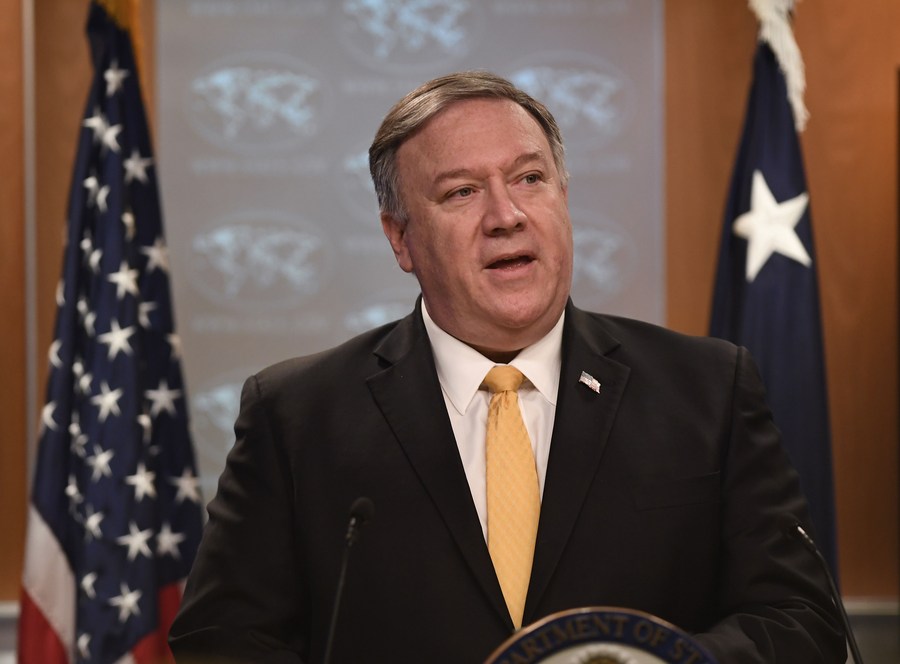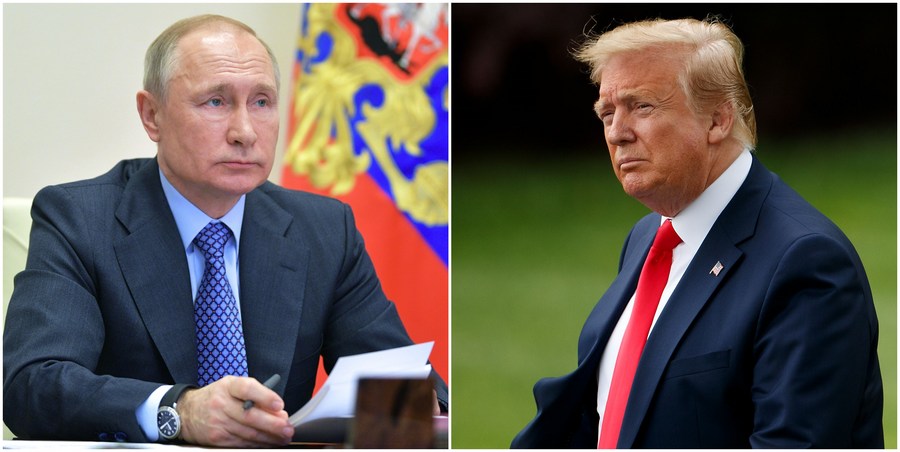
U.S. Secretary of State Mike Pompeo speaks during a press briefing in Washington, D.C., the United States, Feb. 1, 2019. The Trump administration announced on Friday that the United States is withdrawing from a landmark nuclear arms control pact with Russia, a move seen as exacerbating the risk of an international arms race. (Xinhua/Liu Jie)
U.S. and Russian officials had held several rounds of negotiations over arms control in Vienna and Helsinki since June, without making substantive progress.
WASHINGTON, Oct. 22 (Xinhua) -- U.S. Secretary of State Mike Pompeo on Wednesday pressed for immediate negotiations between Washington and Moscow to finalize a verifiable agreement as the two sides seem moving closer to extend a key nuclear arms control treaty.
"Russia has agreed in principle to freeze all of its nuclear warheads ... But we need to make sure that U.S. and Russian negotiators get together just as soon as possible to continue to make progress to finalize a verifiable agreement," Pompeo told reporters at a state department press briefing.
Pompeo's remarks came at a time when the two nuclear superpowers appear to reach common ground on the one-year extension of the New Strategic Arms Reduction Treaty (New START), which will expire in February.
Washington and Moscow signed the New START in 2010. The treaty, which stipulates limits to the numbers of deployed strategic nuclear warheads and delivery systems, is the last remaining nuclear arms control pact in force between the two nuclear superpowers.
The New START can be extended by a maximum of five years with the consent of the two countries. Without an extension, the U.S. and Russian nuclear arsenals would be unchecked for the first time since 1972.
U.S. and Russian officials had held several rounds of negotiations over arms control in Vienna and Helsinki since June, without making substantive progress.

Combo photo shows Russian President Vladimir Putin (L) and U.S. President Donald Trump attending their respective events on different occasions. (Xinhua)
On Friday, Russian President Vladimir Putin proposed extending the New START without conditions for at least a year, but Washington rejected his offer immediately.
"President Putin's response today to extend New START without freezing nuclear warheads is a non-starter," U.S. President Donald Trump's National Security Adviser Robert O'Brien said.
He reaffirmed the U.S. position of a one-year extension, during which both countries cap all nuclear warheads, referring to both strategic and tactical ones.
However, the two sides seemed moving closer this week.
Russia on Wednesday confirmed its readiness to continue negotiations with the United States on the extension of the New START.
"This topic is of strategic nature and global significance. It is in the interests of not only our two countries but also global security and stability," Kremlin spokesman Dmitry Peskov told a daily briefing.
He said Russia hopes that the dialogue with the United States will continue and their differences will be overcome.

Russian Foreign Minister Sergei Lavrov speaks during his annual press conference in Moscow, capital of Russia, Jan. 17, 2020. (Photo by Evgeny Sinitsyn/Xinhua)
The Russian Foreign Ministry said Tuesday that the country is ready to freeze its existing number of nuclear warheads along with the United States to extend the New START by one year.
"We don't have an agreement yet, but, certainly, given the fact that Russia has moved in the direction of the United States' proposal for this cap, it looks like the two sides are getting much, much closer together," U.S. Special Presidential Envoy for Arms Control Marshall Billingslea said Tuesday in an interview with PBS.
Whether an agreement can be reached by the two sides is still an open question.
The Trump administration had long complained that the New START only constraints deployed strategic nuclear warheads and delivery systems for both, but not tactical ones that Russia heavily equipped.
In its Tuesday statement, Russia made it clear that the freeze of nuclear warheads was a "political commitment" and "not be accompanied by any additional demands on the part of the United States," while Washington immediately imposed verification condition, casting doubt on whether the two sides are genuinely moving closer.
"I would simply say that verification is not an add-on when it comes to arms control," said Billingslea. "It's an intrinsic part, a fundamental part of any arms control deal, always has been."
James Acton, a senior fellow at the Carnegie Endowment for International Peace, noted that definitions and verification might not be the most contentious part of arms control negotiation but are often the most time-consuming.
"A deal is possible, but it's unclear whether it's close. A disagreement over whether verification is needed is pretty significant," said the nuclear policy expert. ■



